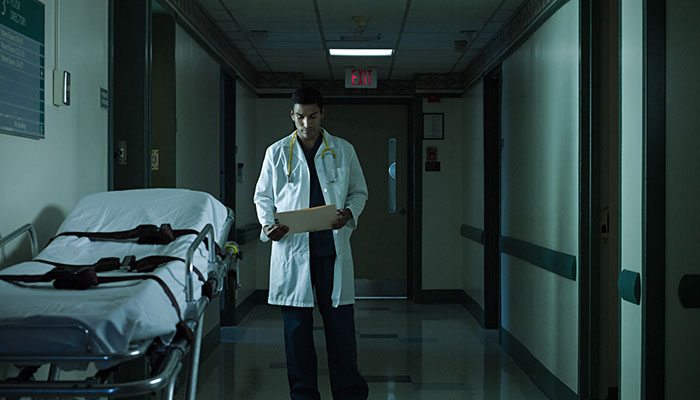All life on Earth is affected by the day-night cycle resulting from the planet’s rotation. In line with this, humans are naturally awake during daylight hours, and sleep at night when it is dark. Being awake during the day means that staying awake at night is directly against our internal clock, producing a similar effect to jetlag in people who work night shift.

Our body clocks control circadian rhythms, the complex cycles that govern many of our biological functions. Our body clocks respond to light and dark, and contribute to us waking in the morning, remaining awake during daylight hours, and beginning to slow down and feel drowsy as it gets dark.
They also control how alert we feel. Many people who work at night find they are extremely tired in the early hours of the morning, as this is when we would normally be asleep. In addition, a second process known as sleep pressure is at work, making us more likely to fall asleep the longer we have been awake.
Light levels also have a big part to play in both wakefulness and alertness. Just as dim light can make us sleepy, being exposed to morning light gives us a boost to wake up, and can make it hard to go to sleep after a night shift.
Who are Australia's shift workers?
By trying to stay awake at night and sleep during the day, we are acting against our circadian and sleep biology, and the body will fight against it. We know that after three-to-four night shifts, the body clock has advanced enough to be able to cope with staying awake at night better.
In Australia, shift work that may contribute to circadian disruption is most common in industries such as healthcare, hospitality, transport, manufacturing, mining, media, and food production, with about 20 per cent of the country’s workforce affected.
A condition called shift work sleep disorder has been identified, which includes trouble with sleep, concentration, headaches, lethargy and tiredness.
Over the years, there has been a trend away from putting people on permanent night shift. In addition to potential impacts on family relationships and quality of life, long-term night work has been linked to an increased risk of certain diseases and chronic conditions. Rotating shifts are now more common, with blocks of days, afternoons, and nights, though this pattern sometimes also involves split shifts, or such a short space between different shifts that the body clock cannot adjust in time.

A condition called shift work sleep disorder has been identified, which includes trouble with sleep, concentration, headaches, lethargy, and tiredness, but if you ask any shift worker, they are likely to recognise these symptoms in themselves. We do know that some people cope better with shift work than others, and a certain proportion are particularly vulnerable to fatigue.
In studies where participants are kept awake at night and tested on tasks involving cognitive performance and reaction time, vulnerable people’s performance will drop dramatically. Sleep researchers are trying to work out how to identify alertness vulnerability prior to symptoms taking effect so that workers can be better informed about whether shift work is a good option for them.
While people who regularly do shift work often develop their own ways of trying to compensate for staying awake at night, adaptation can be tricky, and the same strategies may not be effective for everyone.
TIPS FOR COPING WITH NIGHT SHIFT
Prioritise your sleep and develop a schedule
Stick to a regular sleep schedule when you get home in the morning, just as you would if you were sleeping at night. That might involve dimming lights, avoiding screens, not eating a heavy meal and doing something relaxing like meditating or reading a book.
Light and shade
Getting a reasonable amount of bright light while working at night will help keep you alert, while limiting your exposure to morning light on the way home, perhaps with dark sunglasses, may be beneficial to helping you wind down for sleep. Make your bedroom as dark as you can, possibly adding an eye mask if your blinds or curtains aren’t heavy enough.
Make a comfortable space
Create a comfortable environment for sleep. In addition to making the room dark, keep it cool, and deal with external noise by using ear plugs, noise cancelling devices or relaxing music or sounds.
Before your first night shift
While some people prefer to get up early and then go back to bed for a few hours in the afternoon, others find taking a power nap on the day of their first night shift to be beneficial. Research has shown that power naps are effective because sleeping for more than 20 minutes pushes the body into deep sleep, making it harder to wake up, and affecting alertness after waking.

After your last night shift
Try to get back into your normal sleeping routine as soon as possible after the final shift in a block of nights. Some people prefer sleeping for a few hours and then getting up, while others stay up all day to ensure they are tired enough to sleep all night. A short sleep is probably the better strategy, as your body will be fighting you if you stay awake for 24 hours.
Healthy lifestyle, healthy sleep
All aspects of our lifestyles contribute to the quality of our sleep, and a good diet and sufficient exercise are both important considerations. Consuming alcohol, caffeine or other stimulants, or meals heavy in protein just before going to bed can all have a negative effect on sleep quality, whether at night or during the day. Doing vigorous exercise before bed is likely to act as a stimulant, so time your gym visits for before work rather than after.
A note on pills and supplements
Some people struggling with sleep may be considering sedatives, melatonin supplements, or over-the-counter medications. This is not an approach I would recommend. Sleeping pills are designed for short-term use only, and there is not enough scientific evidence to show whether melatonin or over-the-counter medications are effective. If you are struggling with sleep, due to shift work or any other reason, and considering some form of medication, consult a medical professional before use.
Christopher Gordon is an Associate Professor of sleep health at Macquarie University and a Research Leader at the Woolcock Institute of Medical Research, Australia’s leading sleep and respiratory research centre.



